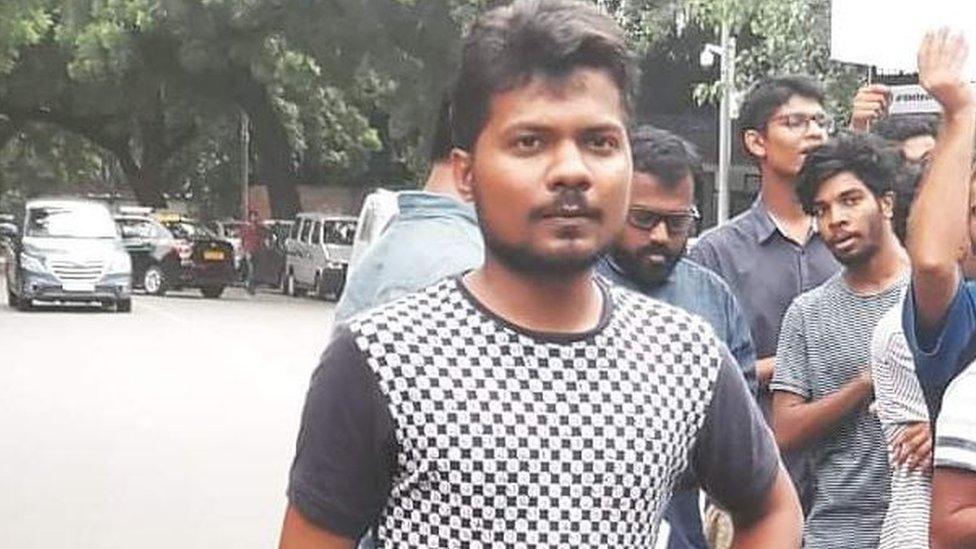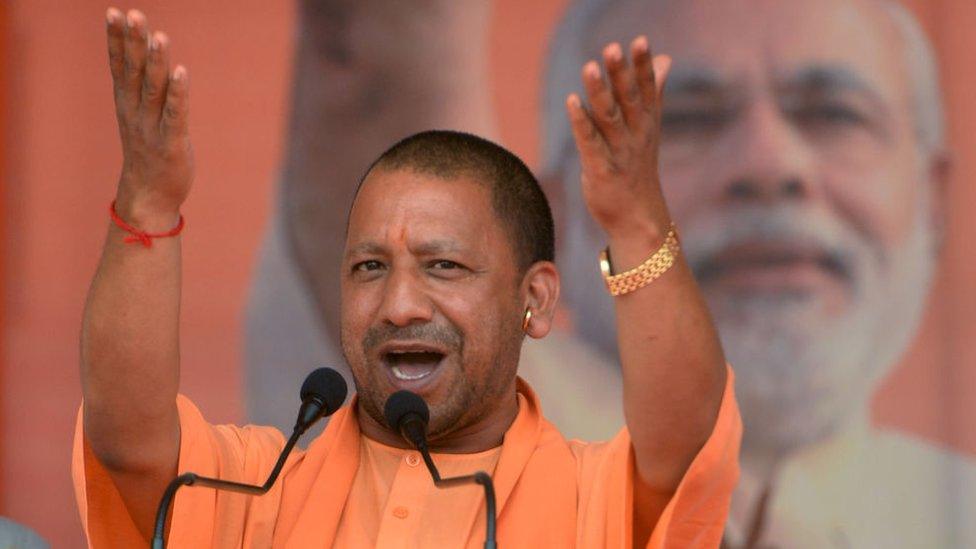Prashant Kanojia: India court raps state for jailing reporter for tweet
- Published

India's Supreme Court has ordered the release of a journalist who was arrested and jailed for tweeting about Uttar Pradesh chief minister Yogi Adityanath on Saturday.
Prashant Kanojia had shared a video of a woman who alleged that she had a relationship with Mr Adityanath.
In the clip, she asks whether he would like to "spend the rest of his life with her".
Police picked him up from his house for "defaming" the chief minister.
What has happened?
Soon after Mr Kanojia posted the tweet, police showed up to his home to arrest him. They claimed that his tweet "defamed" Mr Adityanath.
Two other journalists who work for an Indian television channel, Anuj Shukla and Ishika Singh, were also arrested on Saturday for hosting a discussion that allegedly "maligned" Mr Adityanath. It is not clear if the allegations were over the same video.
And three other people who are not journalists have also been arrested in the state for sharing or posting negative content against Mr Adityanath.

The tweet allegedly 'defamed' Uttar Pradesh Chief Minister Yogi Adityanath
In all, this means six people have been arrested over social media posts about Mr Adityanath in the last three days alone.
Mr Kanojia's wife Jagisha Arora moved the court against his arrest on Monday.
What are the charges against him?
Mr Kanojia was arrested under Section 500 of the Indian Penal Code for defamation, and Section 66 of the Indian Information Technology Act, which deals with computer related offences that are done "dishonestly or fraudulently."
"The tweet was highly objectionable and provocative," former senior police officer Prakash Singh told BBC Hindi's Vineet Khare. "In this country, freedom of speech is being interpreted as a license to abuse, denigrate, rundown, ridicule and insult."
"There is no provision of arrest under Section 500. First you have to prove your case, then you are summoned. You are not arrested until you have been sentenced. This arrest was a clear abuse of the process of law," Arjun Sheoran, a lawyer, told BBC Hindi.
He added that Section 66 is often used in cases that involve hacking.
"If Mr Adityanath felt the comments were defamatory, he should have filed a case. The accused would have been summoned and then possibly sentenced."
What did the court say?
The court did not mince its words in its order, freeing Mr Kanojia.
"A citizen's right to liberty has been infringed. We have gone through the records. Opinions may vary, maybe this sort of thing should not have been published," the Supreme Court said on Tuesday while hearing the petition. "But why arrest? Under what provision has he been arrested for this?"
The court added the journalist had not committed "murder" and added it was very unhappy that he had been made to spend time in jail.
Correspondents say that the court order should pave the way for their release as well.

'This is a state abduction, not an arrest'
Vineet Khare, BBC Hindi
It was a little after noon on 8 June when journalist Prashant Kanojia left home to go buy groceries.
When he returned home, there were two plain-clothes officers outside.
"Before leaving with them, he said he was being taken away for his tweet on Mr Adityanath," Mr Kanojia's wife Jagisha Arora said.
It all happened within minutes.
"When I came back to my senses after a few minutes of him leaving, I called him back. He sounded scared," Ms Arora said. She alleged that the men didn't produce any arrest warrant.
We tried reaching the state police but did not get any response.
"This is a state abduction - not just an arrest," lawyer Arjun Sheoran told me.
"The intent is to intimidate. If this can be done to a journalist, this would stifle all criticism," he said.

What has the reaction been?
The reaction to the verdict has largely been one of relief. The spate of arrests in such a short time had caused massive concern across the country with many saying it had a chilling effect on the freedom of expression.
The arrests had sparked criticism across the board.
The Editorial Guild of India criticised the move, calling it a "condemnable misuse of law and state power".
Rahul Gandhi, president of the main opposition Congress party, strongly denounced the arrest and said that Mr Adityanath was "behaving foolishly".
Allow X content?
This article contains content provided by X. We ask for your permission before anything is loaded, as they may be using cookies and other technologies. You may want to read X’s cookie policy, external and privacy policy, external before accepting. To view this content choose ‘accept and continue’.

Allow X content?
This article contains content provided by X. We ask for your permission before anything is loaded, as they may be using cookies and other technologies. You may want to read X’s cookie policy, external and privacy policy, external before accepting. To view this content choose ‘accept and continue’.

Allow X content?
This article contains content provided by X. We ask for your permission before anything is loaded, as they may be using cookies and other technologies. You may want to read X’s cookie policy, external and privacy policy, external before accepting. To view this content choose ‘accept and continue’.

Allow X content?
This article contains content provided by X. We ask for your permission before anything is loaded, as they may be using cookies and other technologies. You may want to read X’s cookie policy, external and privacy policy, external before accepting. To view this content choose ‘accept and continue’.
Soon after the verdict, Mr Kanojia's wife spoke to reporters.
"I am very happy now. I have faith in the Indian Constitution. My husband has not committed any offence," she said.
The lawyer for the state had argued that the tweet was "very inflammatory" given that Mr Kanojia posted the video on Twitter with a quote from a Hindi film song which says "love will not be hidden even if you attempt to hide it".
He refused to comment on the order, saying the matter was still to be fully resolved.
- Published22 December 2018
- Published29 August 2018